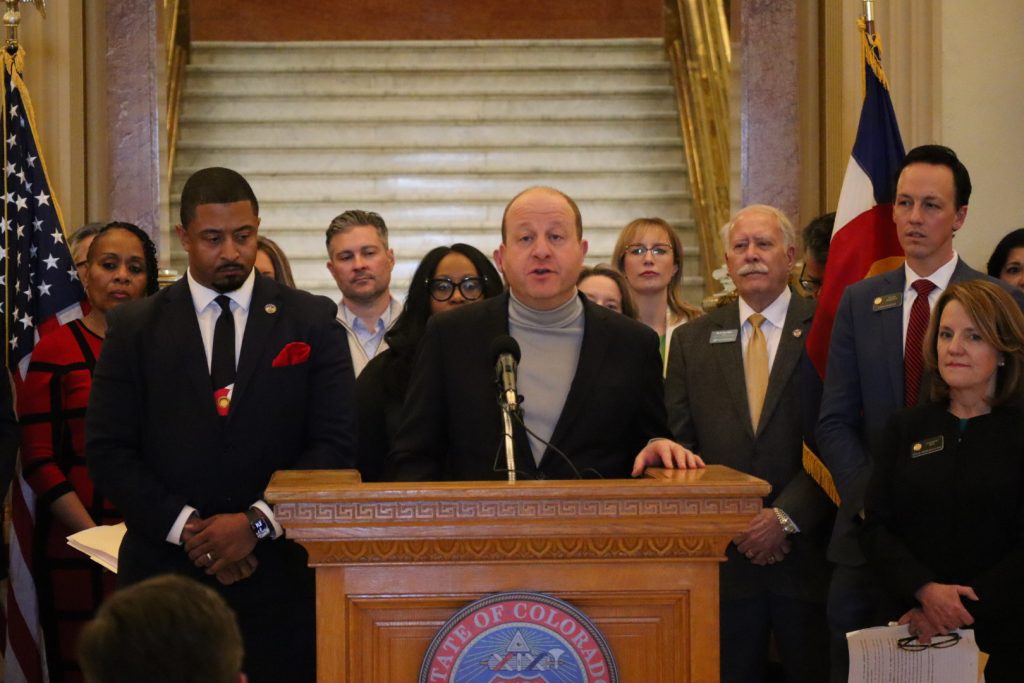Colorado Gov. Jared Polis is on the cusp of advancing a key part of his housing agenda with new bill
A measure to overhaul the state’s construction defects laws in a bid to stimulate more condo development is nearing passage

Robert Tann/Summit Daily News
A high-priority housing bill for Colorado Gov. Jared Polis is nearing his desk as state lawmakers move to approve final changes to the legislation.
House Bill 1272 would overhaul the state’s construction defects laws in an effort to reduce the number of lawsuits filed against developers. Lawmakers say the high risk of costly litigation has stifled condominium development, reducing the amount of starter homes available to first-time buyers.
“Colorado is making historic progress to break down artificial barriers that block housing Coloradans can afford and unnecessarily increase costs, and I’m excited that we continue to build on that progress with this legislation,” Polis said in a statement shared through a spokesperson. “There’s no silver bullet, but this bill will help increase the supply of homes in Colorado, lower costs and increase attainable ownership opportunities for Coloradans.”
It’s the second year in a row lawmakers have attempted to pass what they’ve called construction defects reform after a similar bill failed last session. He had called on lawmakers in his State of the State address in January to pass such a measure.
This year’s bill is led by Reps. Shannon Bird, D-Westminster, and Andrew Boesnecker, D-Fort Collins, as well as Sens. James Coleman, D-Denver, and Dylan Roberts, D-Frisco.

Support Local Journalism
Roberts said more attainable homeownership opportunities are especially needed in rural resort areas where average housing costs can climb into the millions.
“In our mountain communities, we have people who desperately want to be able to buy a first-time home and start building generational wealth and put roots down in our communities,” he said in an interview last month, “but there’s not any stock available, any housing available to make those purchases.”
The measure passed the Senate on Thursday, April 17, in a 32-3 vote. The bill previously passed the House in late March with a vote of 59-5.
The bill creates a program for home builders to opt into that grants them more immunity from defect litigation, so long as they follow several requirements. That includes having a third-party inspection on the home throughout the construction process and providing warranties for homeowners for different aspects of the home, ranging from one year for workmanship to six years for major structural components.
Join the 17,000 readers who get the news from us daily.
Sign up for daily or weekly newsletters at VailDaily.com/newsletter
The bill also raises the threshold for homeowners associations to file a lawsuit against a developer. State law currently allows for a simple majority vote. House Bill 1272 would require a 65% majority in favor for a lawsuit to move forward.
Homeowners can still pursue lawsuits under different scenarios, such as when a home is unsafe, but they would be required to first work with the builder to try and fix the issue and show that they took steps themselves to mitigate problems from becoming worse.
Lawmakers also adopted a slew of amendments to the bill aimed at easing concerns from the homeowner rights group Build Our Homes Right, which had initially opposed the legislation.
That included tightening the requirements around who can qualify as a third-party inspector, ensuring builders don’t insert language into contracts that conflict with state law and removing a provision that gave builders protection during litigation so long as they had secured a certificate of occupancy from a local government.
Other changes were made to clarify that warranties will cover defects and damages at no expense to the homeowner.
“Build Our Homes Right appreciates that Colorado needs more homebuilding to address the state’s housing shortage and affordability crisis,” said Janine Musser, a Westminster homeowner and member of the advocacy group, in a statement. “We’re hopeful that the changes to this bill will ensure those homes are properly built, so that families’ biggest investment and financial stability are protected.”
The bill now goes back to the House, which will need to approve amendments made in the Senate before sending the measure to Polis’ desk.










